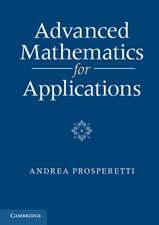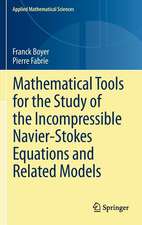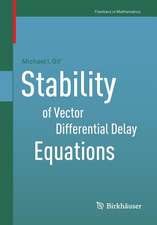Navier–Stokes Equations on R3 × [0, T]
Autor Frank Stenger, Don Tucker, Gerd Baumannen Limba Engleză Hardback – 4 oct 2016
- The functions of S are nearly always conceptual rather than explicit
- Initial and boundary conditions of solutions of PDE are usually drawn from the applied sciences, and as such, they are nearly always piece-wise analytic, and in this case, the solutions have the same properties
- When methods ofapproximation are applied to functions of A they converge at an exponential rate, whereas methods of approximation applied to the functions of S converge only at a polynomial rate
- Enables sharper bounds on the solution enabling easier existence proofs, and a more accurate and more efficient method of solution, including accurate error bounds
Toate formatele și edițiile
| Toate formatele și edițiile | Preț | Express |
|---|---|---|
| Paperback (1) | 637.59 lei 43-57 zile | |
| Springer International Publishing – 14 iun 2018 | 637.59 lei 43-57 zile | |
| Hardback (1) | 643.84 lei 43-57 zile | |
| Springer International Publishing – 4 oct 2016 | 643.84 lei 43-57 zile |
Preț: 643.84 lei
Preț vechi: 757.46 lei
-15% Nou
Puncte Express: 966
Preț estimativ în valută:
123.20€ • 128.97$ • 101.94£
123.20€ • 128.97$ • 101.94£
Carte tipărită la comandă
Livrare economică 07-21 aprilie
Preluare comenzi: 021 569.72.76
Specificații
ISBN-13: 9783319275246
ISBN-10: 3319275240
Pagini: 230
Ilustrații: X, 226 p. 25 illus. in color.
Dimensiuni: 155 x 235 x 14 mm
Greutate: 0.51 kg
Ediția:1st ed. 2016
Editura: Springer International Publishing
Colecția Springer
Locul publicării:Cham, Switzerland
ISBN-10: 3319275240
Pagini: 230
Ilustrații: X, 226 p. 25 illus. in color.
Dimensiuni: 155 x 235 x 14 mm
Greutate: 0.51 kg
Ediția:1st ed. 2016
Editura: Springer International Publishing
Colecția Springer
Locul publicării:Cham, Switzerland
Public țintă
ResearchCuprins
Preface.- Introduction, PDE, and IE Formulations.- Spaces of Analytic Functions.- Spaces of Solution of the N–S Equations.- Proof of Convergence of Iteration 1.6.3.- Numerical Methods for Solving N–S Equations.- Sinc Convolution Examples.- Implementation Notes.- Result Notes.
Textul de pe ultima copertă
In this monograph, leading researchers inthe world of numerical analysis, partial differential equations, and hardcomputational problems study the properties of solutions of the Navier–Stokes partialdifferential equations on (x, y, z, t) ∈ ℝ3× [0, T]. Initially converting the PDE to asystem of integral equations, the authors then describe spaces A of analytic functions that housesolutions of this equation, and show that these spaces of analytic functionsare dense in the spaces S of rapidlydecreasing and infinitely differentiable functions. This method benefits fromthe following advantages:
- The functions of S are nearly always conceptual rather than explicit
- Initial and boundary conditions of solutions of PDE are usually drawn from the applied sciences, and as such, they are nearly always piece-wise analytic,and in this case, the solutions have the same properties
- When methods of approximation are applied to functions of A they converge at an exponential rate, whereas methods of approximation applied to the functions of S converge only at a polynomial rate
- Enables sharper bounds on the solution enabling easier existence proofs, and a more accurate and more efficient method of solution, including accurate error bounds
Caracteristici
Studies the properties of solutions of the Navier–Stokes partial differential equations on (x , y, z , t) ? R3 × [0, T] Demonstrates a new method for determining solutions of the Navier–Stokes equations by converting partial differential equations to a system of integral equations describing spaces of analytic functions containing solutions Enables sharper bounds on solutionsto Navier–Stokes equations, easier existence proofs, and a more accurate,efficient method of determining a solution with accurate error bounds Includes an custom-writtenMathematica package for computing solutions to the Navier–Stokes equationsbased on the author's approximation method Includes supplementary material: sn.pub/extras
![Navier–Stokes Equations on R3 × [0, T] de Frank Stenger](https://i4.books-express.ro/be/9783319275246/navier-stokes-equations-on-r3-0-t.jpg)













